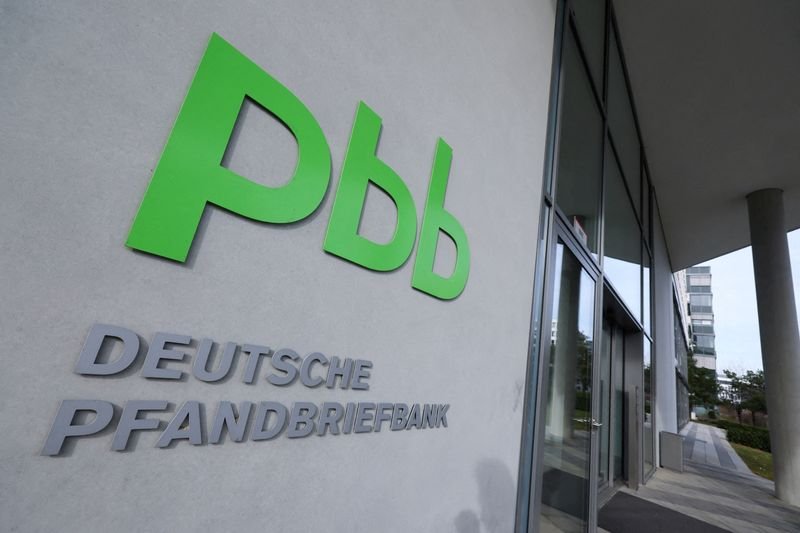
© Reuters. The logo of troubled German property lender Deutsche Pfandbriefbank pbb is pictured at its headquarters as the real estate crisis widens, in Garching near Munich, Germany February 18, 2024. REUTERS/Wolfgang Rattay/File Photo
By Tom Sims and John O’Donnell
FRANKFURT (Reuters) -Deutsche Pfandbriefbank (PBB), one of Germany’s top property financiers dating back to the 1860s and bailed out by the government in 2009, is navigating what it calls “the greatest real estate crisis since the financial crisis”.
The bank has assured investors it has enough funds to cope with a major downturn in the U.S. commercial real estate market. But its shares have fallen sharply this year as short sellers bet against the bank.
“We are well aware of the need to win back trust,” the bank said on Thursday as it reported a plunge in profit.
The following is a timeline of events around the bank:
2005-2008
Hypo Real Estate (HRE), a predecessor of Pfandbriefbank, enjoys a stint on index of blue-chip stocks.
Its business was similar to that of an investment bank for property projects, and it had helped to bankroll the purchase of the Lloyd’s building in the City of London financial district, as well as the refinancing of Canary Wharf in the city’s Docklands area.
2008
With the global financial crisis in full swing, Lehman Brothers collapses, sending shockwaves around the globe.
2009
HRE, which owns PBB, is fully nationalised, after being deemed too important to fail given its role in Germany’s covered bond market – bonds backed by mortgages that are a major source of refinancing for the banking sector in Europe’s biggest economy. The real estate lender received a 10 billion euro ($10.80 billion) capital injection as well as 145 billions in liquidity guarantees.
2011
The European Commission approves the bailout but a condition is that PBB will have to be privatised by the end of 2015.
2015
PBB lists on the Frankfurt stock exchange at an issue price of 10.75 euros per share. Its stated focus is Germany, Britain, France, the Nordics and some countries in central and eastern Europe.
2016
PBB expands into the U.S. market under current CEO Andreas Arndt, at first concentrating on New York, Boston and Washington.
2018
PBB opens an office in New York and widens its focus to U.S. cities including Chicago, Los Angeles, San Francisco and Seattle.
The cover of its 2018 annual report shows a Manhattan building that PBB helped finance with $100 million. “Our commitment in the U.S…is constantly growing,” it said in the report.
2019
It provides a $240 million loan for an apartment building in Long Island City.
2020
PBB arranges a $250 million loan for the financing of a Fifth Avenue building in New York, whose tenants include luxury department store Bergdorf Goodman.
It makes a $150 million loan for the “Solar Carve Tower” in New York City’s Meatpacking District.
2022
Central banks including the European Central Bank and the U.S. Federal Reserve begin aggressive interest rate increases to battle inflation, a significant turning point for the property industry that had benefited from years of low rates.
PBB’s total assets stand at 53 billion euros at end-2022, and its financing volumes in its core real estate business total 29.3 billion euros.
2023
PBB’s U.S. business has grown to 5 billion euros, representing 15% of its overall portfolio.
The lender gets a new chair with Louis Hagen and it announces Kay Wolf will succeed Andreas Arndt as chief executive officer at an unspecified date in 2024.
In November, PBB says real estate market “weakness is persisting for longer than expected” and discloses a “significant” increase in risk provisions, “predominantly related” to financing of U.S. offices.
2024
Feb. 7 The bank announced a doubling in risk provisions as it described “the greatest real estate crisis since the financial crisis”.
Feb. 8 PBB tells investors it has enough funds to cope with a downturn in the U.S. commercial real estate market.
Feb. 9 Germany’s RAG Foundation, one of the bank’s biggest shareholders, trims its stake in PBB as its shares and bonds come under pressure.
Feb. 14 The credit rating agency S&P downgraded PBB to a notch above junk on concerns about its exposure to the commercial real-estate sector and gave it a negative outlook.
Feb. 15 Shares plunge after the downgrade.
Feb. 16 Short sellers increase their bets against the bank, with one saying the bank risked being sucked into a “downward spiral”. PBB said its capital buffers were strong and its business profitable.
Mar. 7 Posts its lowest annual profit and biggest loss for soured loans since going public, underscoring the severity of a widespread real estate slump.
($1 = 0.9261 euros)

